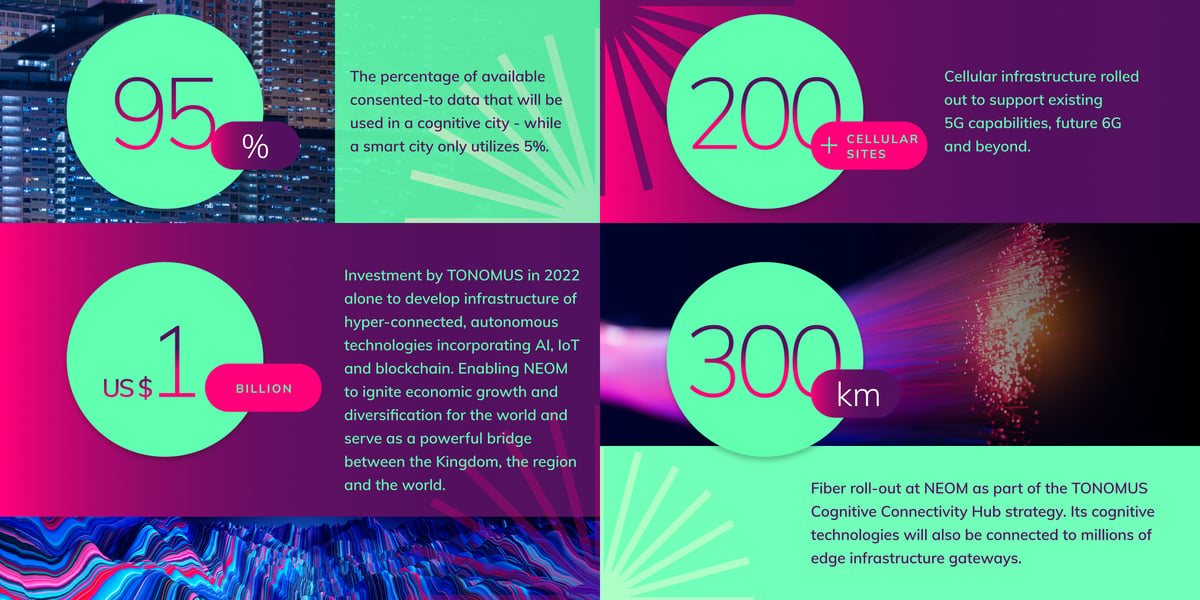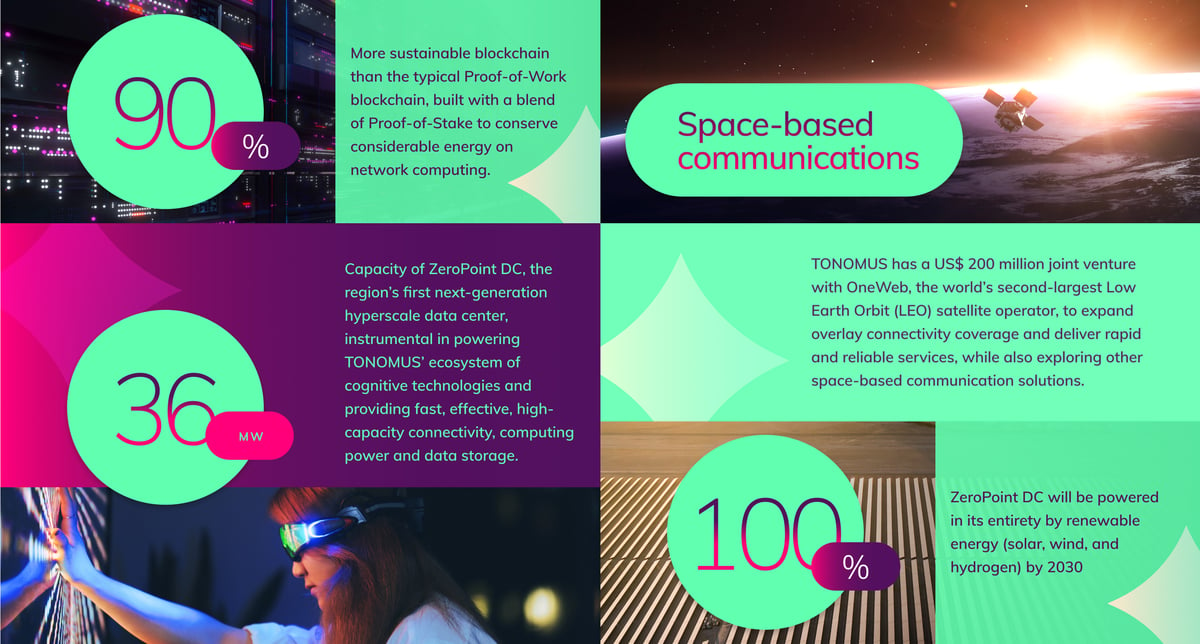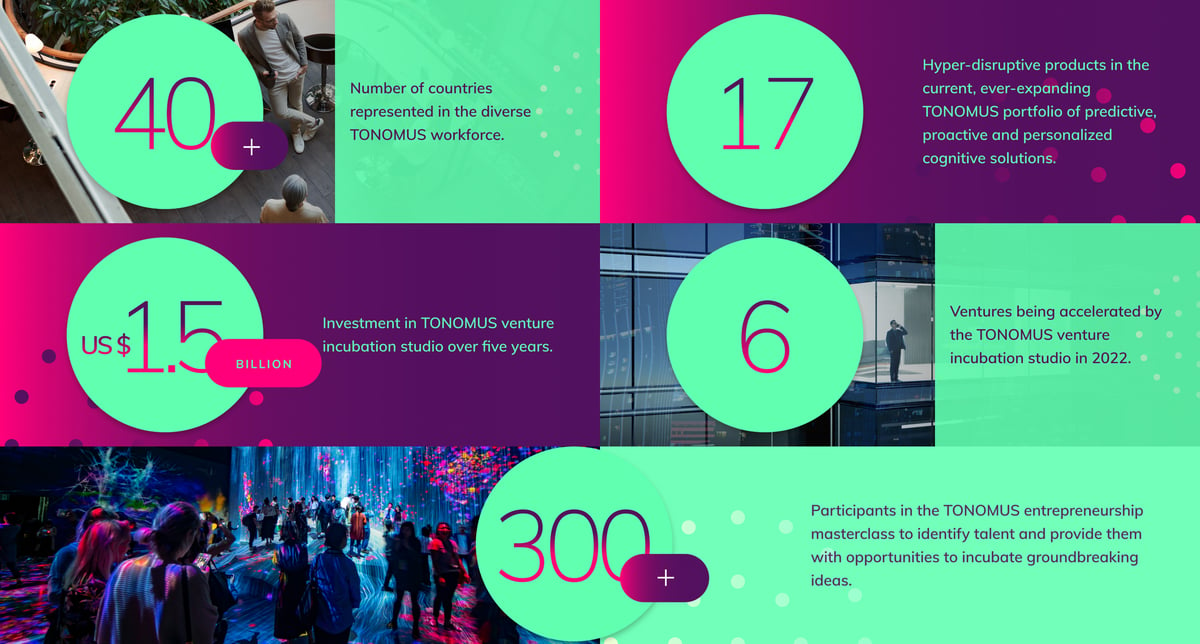
TONOMUS in numbers
The cognitive city uses a wealth of consented data to be proactive, promising a seamless ecosystem that will define the future of urban living
The amount of data created, captured, and consumed globally is growing at an exponential rate, and is set to rise to 175 zettabytes (ZB) by 2025, up from just 33 ZB in 2018. A single ZB equals one trillion gigabytes, which has been compared to the distance of travelling to the Alpha Centauri star system 600 times over.
In a typical minute, the world conducts 5.7m Google searches, views 167 million TikTok videos and sends 575,000 tweets. But how well is this data harnessed to inform positive change? The world’s leading smart cities harness only 5% of the digital information available to them, and yet therein lies the potential to deliver so much more for urban residents.
By contrast, the technology enterprise TONOMUS will leverage 95% of consented data to support NEOM, the world’s first cognitive city being built in Saudi Arabia. Free from the narrow real-time focus of a smart city, the cognitive city uses a wealth of consented data to be proactive and predictive, promising a seamless ecosystem that will place human choice at its center and define the future of urban living.
In a typical minute, the world conducts 5.7m Google searches, views 167 million TikTok videos and sends 575,000 tweets. But how well is this data harnessed to inform positive change? The world’s leading smart cities harness only 5% of the digital information available to them, and yet therein lies the potential to deliver so much more for urban residents.
By contrast, the technology enterprise TONOMUS will leverage 95% of consented data to support NEOM, the world’s first cognitive city being built in Saudi Arabia. Free from the narrow real-time focus of a smart city, the cognitive city uses a wealth of consented data to be proactive and predictive, promising a seamless ecosystem that will place human choice at its center and define the future of urban living.

By investing US$ 1 billion in artificial intelligence (AI) products and services for the global economy, TONOMUS is building the world’s first mixed reality metaverse to merge experiences in the physical world with the digital one.
This is made possible by ubiquitous connectivity supported by hundreds of kilometers of fiber, hundreds of mobile cellular sites and evolving space based communications technologies. TONOMUS is actively investing in space connectivity solutions to support the evolving capabilities of cellular from 5G to 6G and beyond. TONOMUS has built the world’s first data consent management platform so that users have a transparent view of who holds their data and how it is used.
TONOMUS works on principles of trust and inclusivity. “If we don’t establish trust, we can’t secure data and without data there is no value,” says Joseph Bradley, CEO.
This is made possible by ubiquitous connectivity supported by hundreds of kilometers of fiber, hundreds of mobile cellular sites and evolving space based communications technologies. TONOMUS is actively investing in space connectivity solutions to support the evolving capabilities of cellular from 5G to 6G and beyond. TONOMUS has built the world’s first data consent management platform so that users have a transparent view of who holds their data and how it is used.
TONOMUS works on principles of trust and inclusivity. “If we don’t establish trust, we can’t secure data and without data there is no value,” says Joseph Bradley, CEO.

By understanding the value of sharing their securely held data, NEOM residents will spend more time doing the things they care about with the people they most want to be with. In the cognitive city being built on Saudi Arabia’s Red Sea coast, much of the friction of modern life will be erased. Through virtual assistants that comprehensively manage schedules and rearrange meetings at a moment’s notice, residents will save time for what’s truly important in life – from quality time with loved ones to wellness activities.
Cognitive city inhabitants would also authorize their doctors to be data-decision proxies, streamlining medical care and helping to diagnose conditions or ailments ahead of time. This approach to wellness as a priority in daily life will not only support effective management of a resident’s health, but data-decision making has the potential to identify treatments and remedies that are preventative, not only reactive.
Cognitive city inhabitants would also authorize their doctors to be data-decision proxies, streamlining medical care and helping to diagnose conditions or ailments ahead of time. This approach to wellness as a priority in daily life will not only support effective management of a resident’s health, but data-decision making has the potential to identify treatments and remedies that are preventative, not only reactive.

TONOMUS is using data to facilitate effortless transition between the real and virtual worlds, increasing access to education, healthcare services and economic opportunities. Already, its mission is attracting the brightest minds to an international team that is incubating ideas to maximize the value of data for the future good of humanity.

